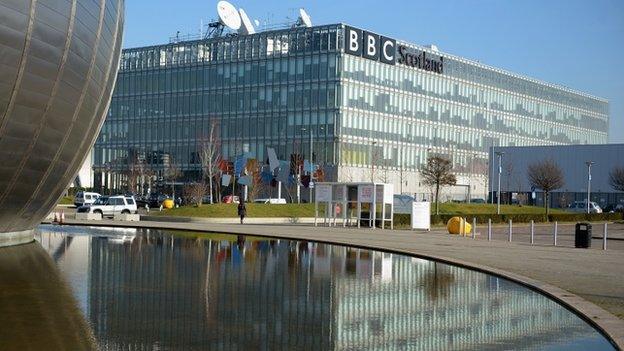Scottish independence: BBC services might not be free, says ex-Trust member
- Published

BBC Scotland is based at Pacific Quay in Glasgow
Access to BBC services in an independent Scotland "would require a great deal of negotiation", a former BBC Trust member has claimed.
Jeremy Peat told MSPs that Scottish viewers might not have "free and unfettered" access to all BBC services.
He suggested that digital services could be cut off and viewers could be required to pay for other services.
The Scottish government said viewers "would still be able to watch all the BBC's output post-independence".
Mr Peat, appearing before the Scottish Parliament's education and culture committee, argued: "I don't think there can be the presumption that access would continue on a free and unfettered basis to all services."
In response to a question from Liberal Democrat MSP Liam McArthur on what was likely to happen in the event of a Yes vote in September's referendum, Mr Peat said: "So far as access to BBC services is concerned post-independence, my understanding is DTT (digital terrestrial television) could be cut off close to the border."
'Requirement to pay'
He added: "Already so far as the iPlayer is concerned and the web is concerned, for countries outwith the UK there is a requirement to pay for access and a somewhat different service is provided.
"I would assume that the starting point again would be that those services would be available to Scotland as an independent nation in a different way from the way they are at the moment, for payment, and potentially a different service."
Mr Peat, who was a member of the BBC's governing body from 2005 to 2010, said viewers in Ireland had "access to the majority of BBC services" but that he believed it was on "a commercial basis".
Viewers in the UK pay a TV licence fee to fund the BBC. The Republic of Ireland's public service broadcaster, RTE, is funded through a licence fee and by advertising.
In 2010 the governments of the UK and the Republic of Ireland signed a memorandum of understanding, external enabling "the widespread availability of RTE services in Northern Ireland on a free-to-air basis, and BBC services in Ireland on a paid for basis".
Scottish Broadcasting Service
In its White Paper on independence, the Scottish government proposed the establishment of a Scottish Broadcasting Service, external (SBS).
The SBS would be funded by the licence fee and would supply programmes to the BBC in return for access to BBC programmes.
"The deal that is set out is extremely attractive to Scotland if it can be negotiated and implemented, but I am simply saying it is not a deal that can be deemed done until negotiations and discussions have taken place," Mr Peat told the committee.
Lorne Boswell from the actors' union, Equity, told the same committee: "The BBC is part of the social union of these islands and we should keep the BBC after independence."
Mr Boswell, Equity's Scottish secretary, said he could "see no reason why STV couldn't be the national broadcaster" in an independent Scotland.
However, the White Paper says that "existing licences for broadcasters in Scotland will be fully honoured" and commercial broadcaster STV's current deal with the ITV network is set to continue until 2024.
Licence payers 'entitled'
A Scottish government spokesman said: "Viewers across Scotland would still be able to watch all the BBC's output post-independence, just as they do now.
"The BBC is watched, as live, in Ireland, the Netherlands and Switzerland, so it makes no sense to suggest that an independent Scotland would be uniquely blocked.
"The fact is, Scottish licence fee payers have contributed to the BBC and would be entitled to a reasonable share of that asset following independence.
"Viewers and listeners would continue to receive the programmes and channels they currently enjoy, but with significantly more programmes being commissioned and produced in Scotland."